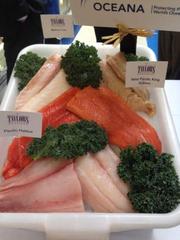 bill, if passed, would place seafood suppliers and restaurant owners on the hook for a $1,000 fine and up to a year in jail for selling mislabeled seafood.
bill, if passed, would place seafood suppliers and restaurant owners on the hook for a $1,000 fine and up to a year in jail for selling mislabeled seafood.SB 1138, authored by state Sen. Alex Padilla, D-Los Angeles, would require labeling of fresh, frozen, processed and others forms of fish to be identified by its “common name,” which “means the common name or market name for any seafood species identified in the Seafood List issued by the federal Food and Drug Administration,” the bill states.
“I’ve come to learn that consumers don’t always get what they pay for,” Padilla said at a Monday morning press conference at Sacramento’s Taylor’s Market, where owner Danny Johnson gave a demonstration on identifying seafood. “Consumers deserve to be serve fish they’ve ordered.”
SB 1138 aims to counter widespread fraud in the state’s seafood supply chain. According to a national study by Oceana, a Monterey-based ocean conservation and advocacy group, 44 percent of grocery stores, restaurants and sushi eateries surveyed sold mislabeled seafood. Southern California ranked as the area with the highest mislabeling rate at 52 percent, which is 20 percent higher than the national average. Oceana found that 84 percent of sushi samples in Southern California were mislabled.
A two-part series by the Boston Globe in 2011 also found widespread fraud and mislabeling in Massachusetts’ bountiful seafood industry. The investigation found that 48 percent of fish collected from markets and grocery stores were mislabeled.
Mislabeling can occur at various stages of the seafood business, including distributors trying to dupe clients and chefs simply confusing various species of fish. According to Oceana, snapper and tuna are the two most commonly mislabeled types of fish. White tuna is often found to be escolar, a mackerel species that’s infamous for causing stomach discomfort when eaten in large amounts.
SB 1138, which was introduced on Feb. 20, will be heard Wednesday in the Senate health committee.





